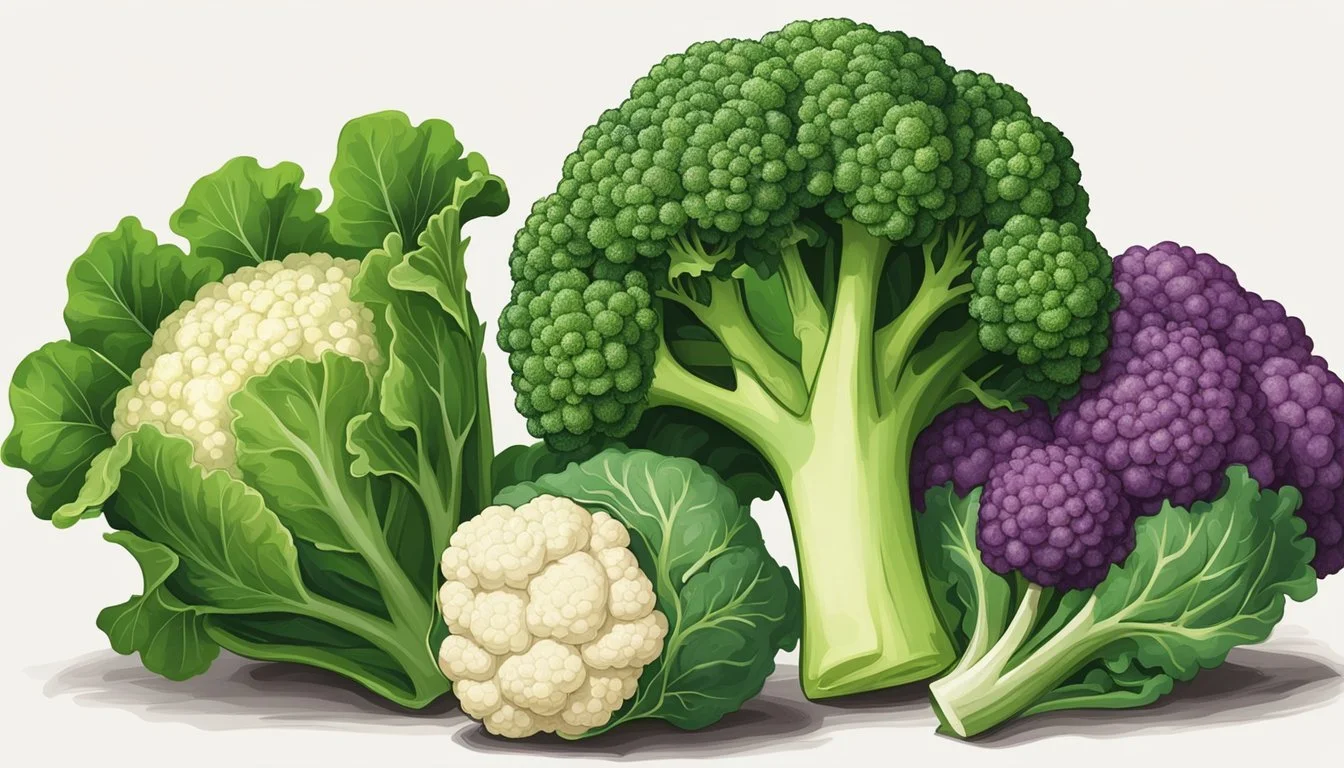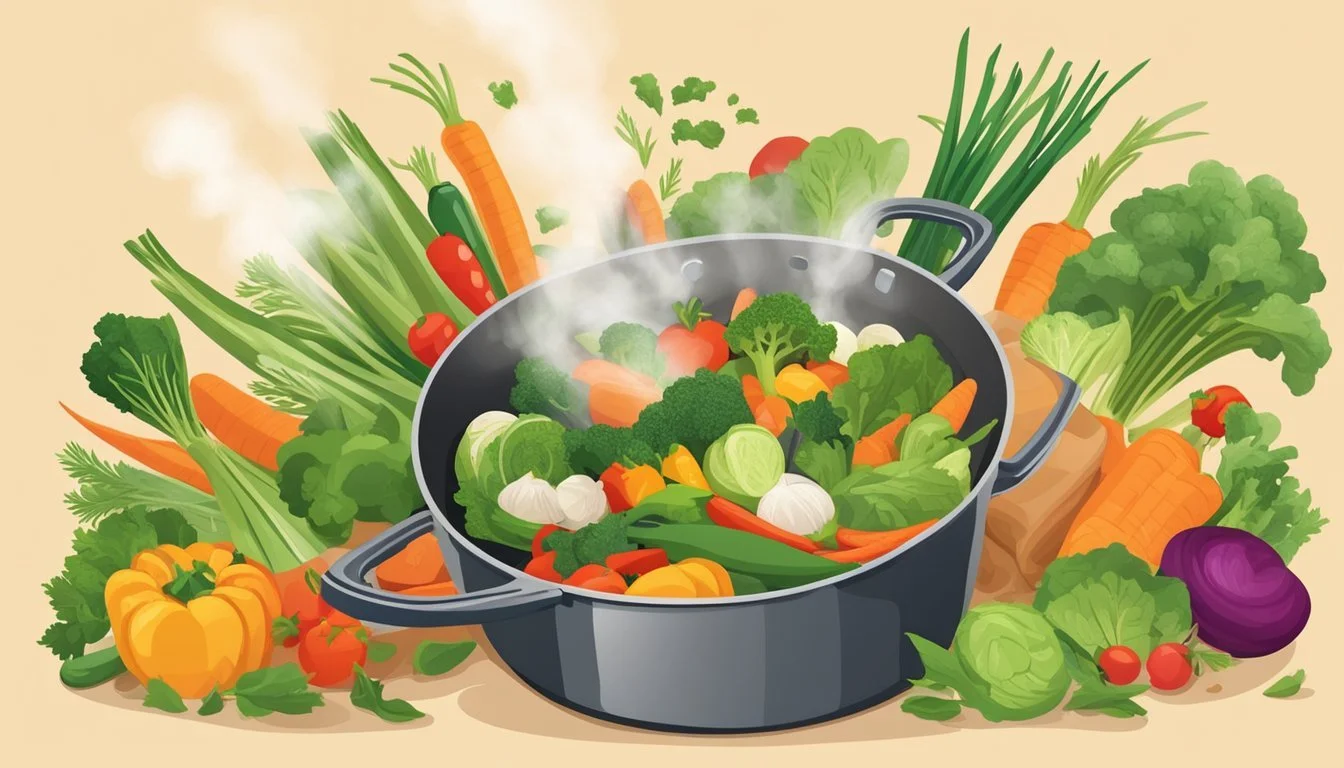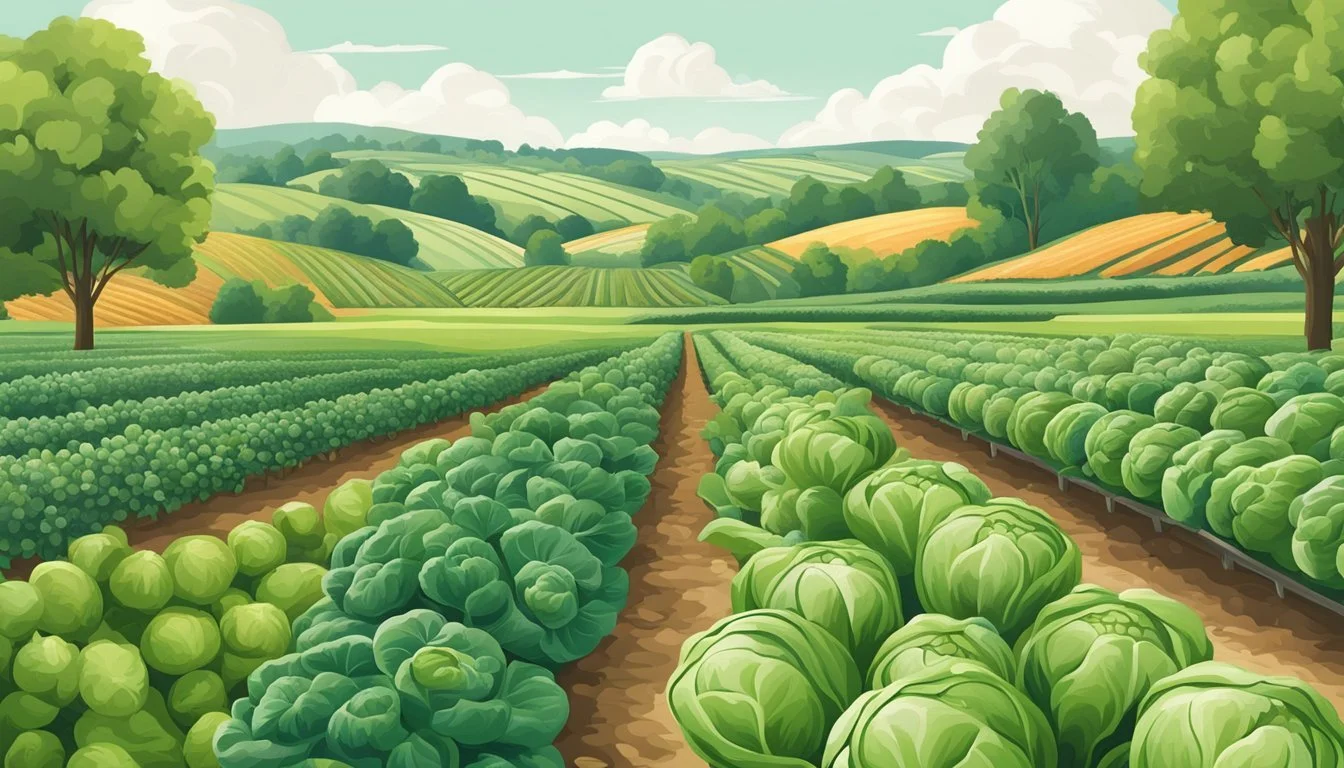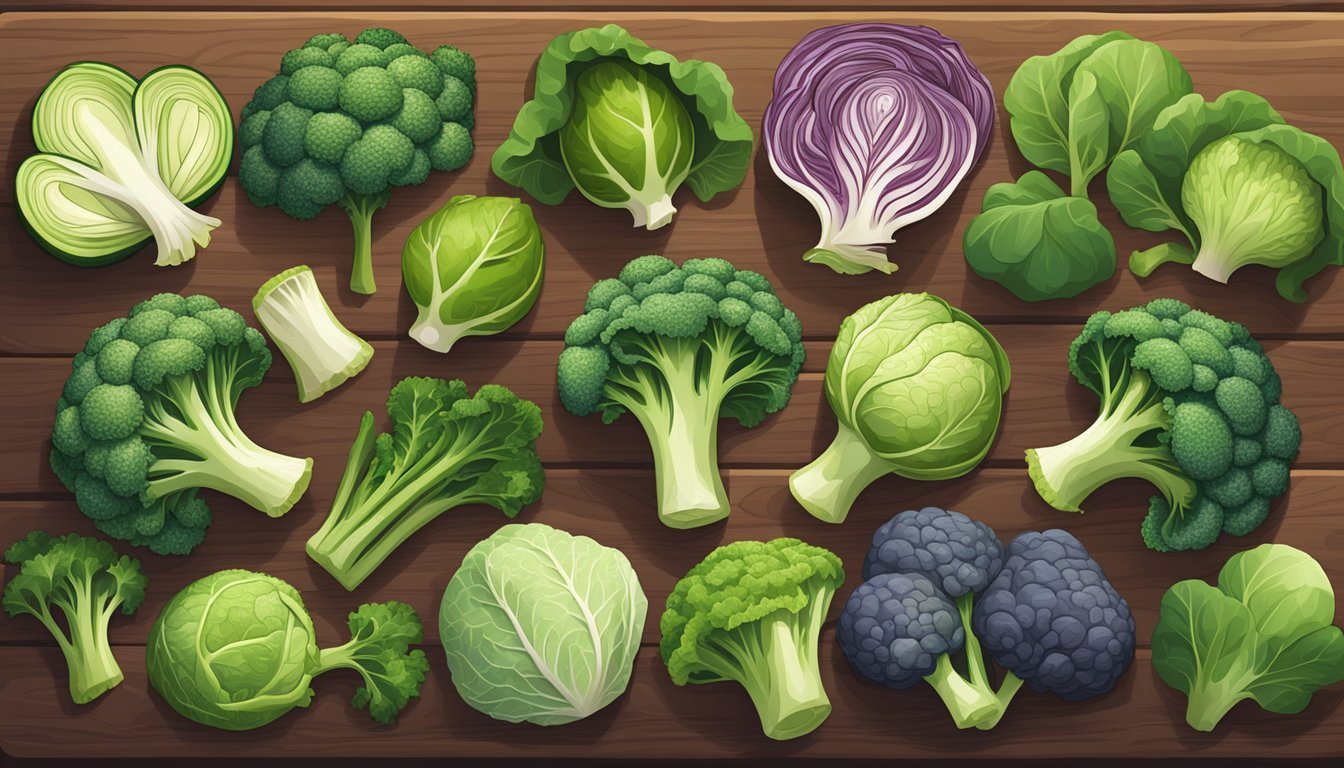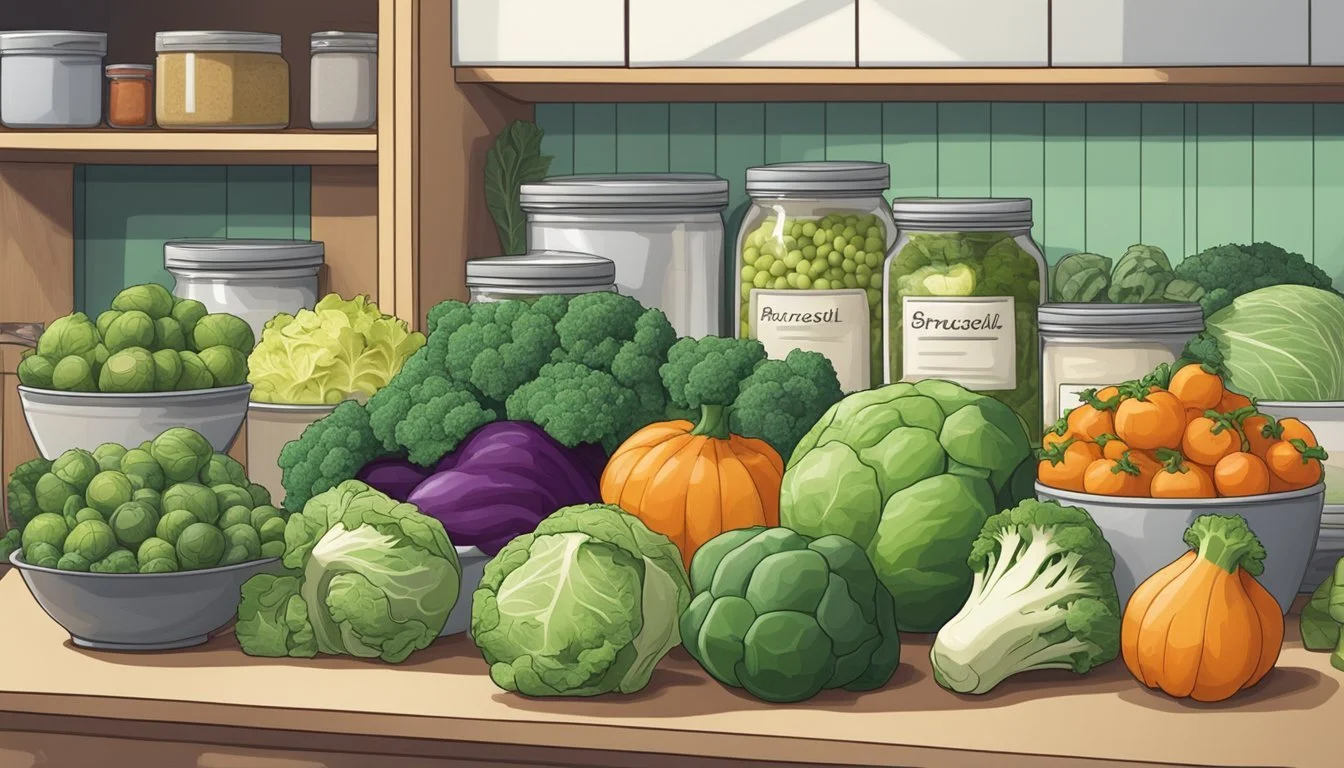Brussels Sprouts Substitutes
Top Alternatives for Your Dishes
Brussels sprouts, with their unique appearance resembling miniature cabbages, have long been admired for their dense nutritional profile and versatility in the kitchen. These fall and winter vegetables are a staple, particularly for their high vitamin C and fiber content, making them a smart addition to a health-conscious diet. They grow on stalks and can be roasted, steamed, or sautéed, offering a slightly bitter, nutty flavor that complements a range of dishes. However, not everyone is fond of their distinctive taste or texture, and at times they may not be readily available in markets.
When a recipe calls for Brussels sprouts, there's no need for concern if they're not to one's taste or if they're simply out of reach. The culinary world offers a variety of vegetables that can step in as substitutes without compromising the nutritional value or overall flavor profile of a meal. Vegetables like broccoli, cabbage, and kale share the cruciferous family tree with Brussels sprouts and thus bear similar traits in terms of texture and taste. Others such as green beans, peas, and asparagus provide a different but equally satisfying experience in dishes where Brussels sprouts would typically feature.
Selecting an alternative to Brussels sprouts hinges on the desired outcome of the dish. Cooks might consider the texture, taste, and nutritional components when choosing a substitute. Broccoli, for instance, matches Brussels sprouts on several nutritional fronts and can be prepared in similar ways. Meanwhile, bok choy provides a different texture but still maintains a richness in vitamins. Each substitute offers its own set of benefits and can be used effectively in various culinary contexts, from stir-fries to casseroles, ensuring that the absence of Brussels sprouts doesn't compromise the dish's integrity or flavor.
Why Consider Brussels Sprouts Substitutes?
When opting for Brussels sprouts substitutes, individuals typically focus on taste preferences, nutritional profiles, and the availability of the vegetables.
Taste and Flavor Preferences
Some people might find the taste of Brussels sprouts too bitter or earthy for their liking. This can drive them to search for substitutes that have a milder, sweeter taste, or a different flavor profile that aligns more closely with their personal preferences.
Nutritional Considerations
While Brussels sprouts are nutrient-dense, offering health benefits such as vitamin C and fiber, other vegetables may provide varied nutritional benefits. For instance, leeks are well-regarded for their favorable nutrient profile, often being chosen as an alternative for those who wish to diversify the nutrients in their diet.
Availability and Seasonality
Brussels sprouts are typically in peak season during the winter months, which can affect their availability and price at other times of the year. During off-season periods, shoppers may seek out locally available substitutes to satisfy their culinary needs while also potentially reducing their environmental footprint.
Nutritional Profile of Brussels Sprouts
Brussels sprouts are a nutrient-dense vegetable known for their rich content of vitamins, minerals, and dietary fiber. They are a low-calorie food that provides essential nutrients without compromising dietary goals.
Vitamins and Minerals Content
Brussels sprouts are an excellent source of vitamin C and vitamin K, providing significant amounts of these essential vitamins. In addition to these, they contain a good range of minerals including calcium and iron, as well as valuable folates which are critical for DNA synthesis and repair.
Vitamin C: Crucial for immune system function and skin health.
Vitamin K: Important for bone health and blood clotting.
Calcium: Essential for strong bones and teeth.
Iron: Vital for the transport of oxygen in the bloodstream.
Folates: Necessary for cell division and growth.
Fiber and Protein Benefits
Brussels sprouts are high in dietary fiber, which supports digestive health and aids in maintaining a feeling of fullness. They are also a good plant-based source of protein, making them beneficial for muscle repair and overall health.
Fiber: Aids in digestion and contributes to heart health.
Protein: Supports muscle repair and growth.
Low-Calorie Vegetable Option
One of the key advantages of Brussels sprouts is that they are low in calories, which makes them an ideal addition to any weight management diet. Their low-calorie nature does not diminish their nutritional value, as they remain packed with beneficial nutrients.
Low in Calories: Helps in managing dietary calorie intake while still providing essential nutrients.
Common Substitutes for Brussels Sprouts
When looking for alternatives to Brussels sprouts, one can explore options ranging from cruciferous vegetables to leafy greens and root vegetables, each offering their unique flavors and culinary uses.
Cruciferous Vegetable Alternatives
Cruciferous vegetables share a lot in common with Brussels sprouts in terms of texture and nutritional value. Broccoli is often used as a substitute since its florets can mimic the size and shape of Brussels sprouts when separated from the stalk. Cauliflower can also take on a similar role; whether roasted or steamed, it offers a mild, nutty flavor that works well as a stand-in.
Broccoli: A good source of fiber and protein, similar in taste and texture.
Cauliflower: Versatile and can absorb seasonings well, making it a great candidate for a variety of dishes.
Leafy Green Varieties
Leafy greens can serve as suitable substitutes due to their nutritional profile and ease of preparation. Kale and collard greens are robust vegetables that can withstand hearty cooking just like Brussels sprouts. They are typically sautéed or steamed, retaining a firm texture. Spinach and bok choy are softer, offering a more delicate alternative when a lighter side dish is desired.
Kale: Bold in flavor and pairs well with ingredients similar to those using Brussels sprouts.
Collard Greens: Require a longer cooking time but develop a deep, earthy flavor.
Spinach: Provides a tender texture with a slightly sweet taste.
Bok Choy: Crisp stalks with tender leaves providing a mild flavor.
Root Vegetable Options
For those who prefer a heartier substitute with a grounding earthiness, root vegetables are an excellent choice. Beetroot and celeriac both present an earthy sweetness that can play well with the flavors that typically accompany Brussels sprouts. They can be roasted to draw out a natural caramelization or used in stews for depth.
Beetroot: Roasting brings out a sweet, caramelized flavor akin to roasted Brussels sprouts.
Celeriac: Its subtle, nutty taste makes it a fine replacement when diced or puréed.
Cooking with Brussels Sprouts Substitutes
When cooking with substitutes for Brussels sprouts, it's important to consider how these alternatives will interact with common cooking methods like steaming, boiling, roasting, and grilling, as well as how they incorporate into soups and stews. The texture and preparation of these substitutes can significantly influence the final dish.
Steaming and Boiling Methods
Cabbage and broccoli are excellent substitutes for Brussels sprouts when steaming or boiling. They maintain a similar texture and absorb flavors well. For example, to steam broccoli as a stand-in, cut it into florets and steam for 3-4 minutes until tender but still crisp, mirroring the cooking time of Brussels sprouts.
Cabbage: Cut into wedges; steam for 6-10 minutes
Broccoli: Separate into florets; steam for 3-4 minutes
Roasting and Grilling Techniques
Vegetables like cauliflower and kale can be used for roasting and grilling as a Brussels sprout substitute. Cauliflower florets become delightfully crisp and golden when roasted at a high temperature, offering a nutty flavor that's an excellent replacement.
Cauliflower: Tossed in oil, roast at 425°F (220°C) for 25-30 minutes
Kale: Drizzle with oil, roast at 350°F (175°C) until edges are crispy, approximately 10-15 minutes
Incorporating into Soups and Stews
Leeks and celeriac are vegetables that can substitute for Brussels sprouts in soups and stews. They both contribute a unique flavor profile and maintain integrity during the cooking process, which is essential for creating a pleasing texture in the final dish.
Leeks: Slice thinly; sauté before adding to soups
Celeriac: Dice into small cubes; add to stews and simmer until tender
Recipes and Meal Ideas
This section offers practical recipes and meal ideas for incorporating versatile Brussels sprout substitutes into everyday cooking, ranging from side dishes to hearty entrees.
Side Dishes and Salads
Broccoli Almondine: A classic side dish, it involves sautéed broccoli topped with toasted almonds. This dish pairs well with a variety of meats and is a nutritious alternative to Brussels sprouts.
Kale and Cabbage Coleslaw: A refreshing salad that combines shredded kale and cabbage, dressed in a light vinaigrette. It serves as an excellent side or a complement to tacos.
Main Courses and Entrees
Cauliflower Steak: Thickly sliced cauliflower seasoned and roasted until tender makes a substantial meat-free entrée. Serve it with a side of quinoa or roasted potatoes.
Collard Wraps: Stuff large collard green leaves with a mixture of sautéed vegetables and a protein of your choice, such as grilled chicken or tofu, for a healthy and satisfying main course.
Creative Uses in Snacks and Appetizers
Stuffed Swiss Chard Rolls: Swiss chard leaves filled with a savory rice and herb mixture, baked until the flavors meld together, are perfect for an appetizer or a light meal.
Green Bean Tacos: Crisp green beans sautéed with spices and served in soft corn tortillas offer a unique twist on traditional tacos, ideal for a quick and tasty snack.
Considerations for Food Sensitivity and Diets
When selecting substitutes for Brussels sprouts, individuals with dietary restrictions due to food sensitivities, allergies, and health considerations should opt for alternatives that align with their specific needs. This section will outline gluten-free and vegan options, as well as low-FODMAP and anti-inflammatory choices to ensure that dietary substitutions are made safely and healthily.
Gluten-Free and Vegan Options
For those following a gluten-free or vegan diet, many cruciferous vegetables, such as broccoli and kale, serve as excellent replacements for Brussels sprouts. These vegetables are naturally gluten-free and fit well within a plant-based diet. They also offer similar nutritional profiles, packed with fiber and vitamin C, ensuring they contribute positively to one's health and well-being.
Gluten-Free and Vegan Substitutes:
Broccoli
Kale
Green beans
Low-FODMAP and Anti-Inflammatory Choices
Individuals with sensitivities to certain carbohydrates may follow a low-FODMAP diet to minimize gastrointestinal distress. For them, alternatives like collard greens and green beans are suitable as they are considered low in fermentable carbohydrates. Also, those seeking anti-inflammatory benefits may lean towards vegetables with high nutrient contents that aid in reducing inflammation.
Low-FODMAP Choices:
Green beans
Kale
Anti-Inflammatory Substitutes:
Cabbage
Kale
Swiss chard
When individuals are affected by allergies, ensuring substitutes do not trigger any adverse reactions is vital. Many of the mentioned vegetables are less commonly allergenic, which makes them safer options for those concerned about possible allergic reactions. However, it’s always recommended to consult with a healthcare professional when modifying one's diet due to allergies or health conditions.
Seasonal and Geographic Variability
When considering substitutes for Brussels sprouts, one must take into account not only the seasons but also the geographic locations of produce. Availability can significantly influence the options on hand.
Local and Organic Alternatives
Local farmers' markets are a treasure trove of seasonal vegetables that can stand in for Brussels sprouts. In the spring and summer, one might find broccoli and kale, which are locally grown and can mimic the taste and texture of Brussels sprouts. Organic alternatives also offer a high nutritional profile and maintain eco-friendly practices. They present options for consumers looking for substitutes grown without synthetic pesticides or fertilizers.
Spring/Summer Substitutes:
Broccoli: Similar to Brussels sprouts in taste and structure, frequently found in local markets during warmer months.
Kale: Offers a hearty, leafy texture and can replace Brussels sprouts in many dishes, with the benefit of local, organic growth.
Imported and Exotic Substitutes
Outside of the local season, supermarkets often stock imported vegetables that can substitute for Brussels sprouts. These imported options, while not always organic, provide diversity and year-round availability. One might encounter vegetables like bok choy and Napa cabbage from places with different growing seasons, such as parts of Asia or South America. It's essential to consider the geographic origins and seasonality to appreciate the environmental impact of importing produce.
Imported Substitutes:
Bok Choy: An Asian vegetable that offers a crisp texture and is suitable in stir-fries and salads.
Napa Cabbage: A milder cabbage that pairs well in various dishes seeking a substitute for a more Belgian-centered vegetable like Brussels sprouts.
Health Benefits of Substituting Brussels Sprouts
While Brussels sprouts are a nutritious choice for many, substituting them can offer diverse health benefits without sacrificing antioxidants and aiding in maintaining a balanced diet.
Antioxidant-Rich Options
Several vegetables can serve as robust alternatives to Brussels sprouts, each encompassing unique antioxidant properties beneficial to one’s health. Broccoli and kale, like Brussels sprouts, are cruciferous vegetables that provide ample antioxidants, which are vital in fighting oxidative stress and may reduce the risk of chronic diseases. Leeks provide not only a flavorful substitute but also a notable antioxidant profile, often containing a wealth of vitamins and minerals.
Contribution to a Balanced Diet
Incorporating a variety of Brussels sprouts substitutes ensures a versatile and nutritious diet. Substitutes such as cauliflower and bok choy offer different textures and flavors while contributing essential nutrients that support a balanced diet. These greens and other cruciferous vegetables like napa cabbage lend themselves to a wide range of dishes, ensuring that individuals receive a blend of vitamins, fiber, and other important nutrients across their meals.
Shopping and Storage Tips
When looking for Brussels sprouts substitutes, shoppers should seek vegetables with similar textures and flavor profiles. Proper storage is key to maintaining freshness and extending shelf life, ensuring the substitutes remain a nutritious and affordable option.
Selecting the Best Substitutes
In choosing substitutes for Brussels sprouts, shoppers are advised to opt for fresh, firm, and vibrant-looking vegetables. Cruciferous vegetables like broccoli, cabbage, kale, and collard greens fit the bill with comparable nutritional benefits. Vegetables like Swiss chard, escarole, green beans, and peas are also suitable alternatives. For a unique option, one might consider leeks, known for their delicate, buttery flavor, or celeriac, with its earthy taste.
Broccoli and cauliflower should be free of dark spots and firm to the touch.
Kale and collard greens should have a deep, vibrant color without any yellowing.
Seek out green beans and peas that are crisp and snap easily.
Preservation and Shelf Life
Proper storage techniques are essential for maintaining the quality and extending the life of Brussels sprouts substitutes.
Refrigeration: Most substitutes should be stored in a refrigerator's crisper drawer and kept in breathable storage bags to retain their crispness.
Blanching: For long-term storage, vegetables like green beans and broccoli can be blanched and frozen to preserve nutrients.
No Washing: It's advisable not to wash the veggies until right before use to prevent moisture-related spoilage.
Shelf life varies among substitutes:
Vegetable Refrigerated Shelf Life Notes Broccoli 7-14 days Store in a loose plastic bag Cabbage 1-2 months Keep whole head wrapped in plastic Kale 5-7 days Keep in airtight container lined with paper Green Beans 7 days Store in a plastic bag Peas 3-5 days Keep in their pods until use
The fresher the produce at the time of purchase, the longer its potential shelf life. Being mindful of how each vegetable is stored will ensure they remain fresh, tasty, and ready for use as a substitute in any recipe that calls for Brussels sprouts.



